Plexus: Your Fully Integrated Solution
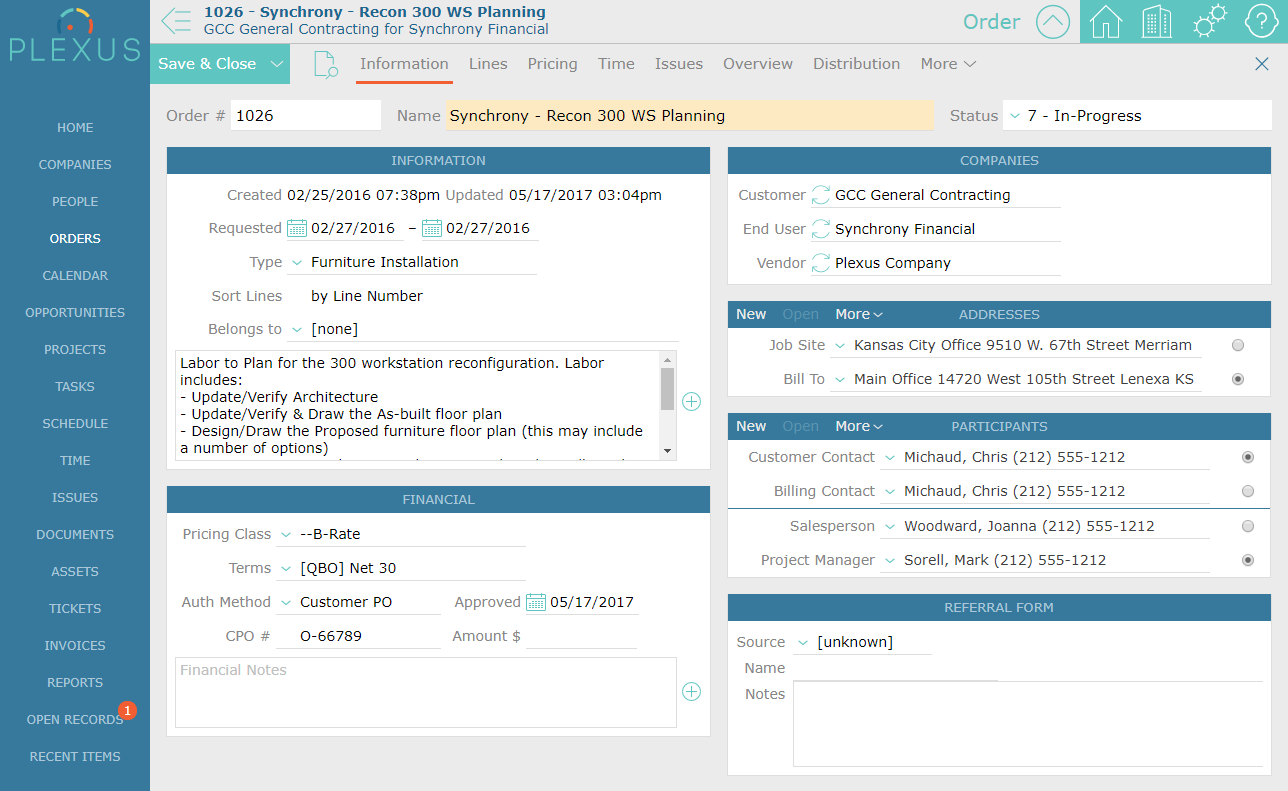
Proposals and job orders are the core of any service company. Making a good first impression is often expressed through your company's ability to present and share professionally crafted proposals in a timely manner. Not only does Orders help you organize your workflow, it ultimately governs your agreed upon best practices for more integrated implementation. The Orders module provides job information access to all team members as they need it, ensuring it's completed on time and at the highest level.
Order Templates automate the creation of orders, simplifying the user experience. Templates structure the process to ensure consistency in creating orders.
Order Groups organize order lines into manageable sections, provide subtotaling, and facilitate multi-location and multi-phase orders.
Intelligent Pricing factors together multiple variables (customer contract, service type, service area, job scope, and vendor) to ensure price accuracy and consistency based on your pricing model regardless of the user. It also reduces pricing errors, protecting the company's profit margins.
Service Options capture the questions experienced estimators would ask by presenting important job and site-related questions that will impact the job price and scope, minimizing oversights.
Time & Material Billing automatically increases the sell value of time and material (T&M) line items as employees book time or log materials and expenses used.
Rule-Based Workflow ensures all users use the same method for working with orders, governing the best practices of your company. Different types of orders can have different workflows.
Custom Forms captures critical information from your customers and field crews with forms that can be customized based on industry in order to maintain the most relevant records for viewing and reporting.
Custom Overviews are available to tailor the presentation style to various customers and vendors, as well as internal staff.
Change Orders can be added onto the original order enhancing job costing.
Hourly Service Lines link service lines to the time management system for instant updates and a comprehensive view of time recorded.
Job Costing pulls in costs from employee loaded wages, expense reports, vendor bills, and ancillary costs, and compares with the original estimated cost, allowing management to gauge their actual margins on an order-by-order basis.
Work Order Time Summary displays all time associated with all employees for a work order, and provides an at-a-glance review of the order's labor costs.
Terms & Conditions can be included on orders based on specific rules to ensure legal aspects are covered.
Intelligent Communication provides individually configured real-time order information to all relevant employees and customers, reducing interdepartmental communication errors and improving efficiency.
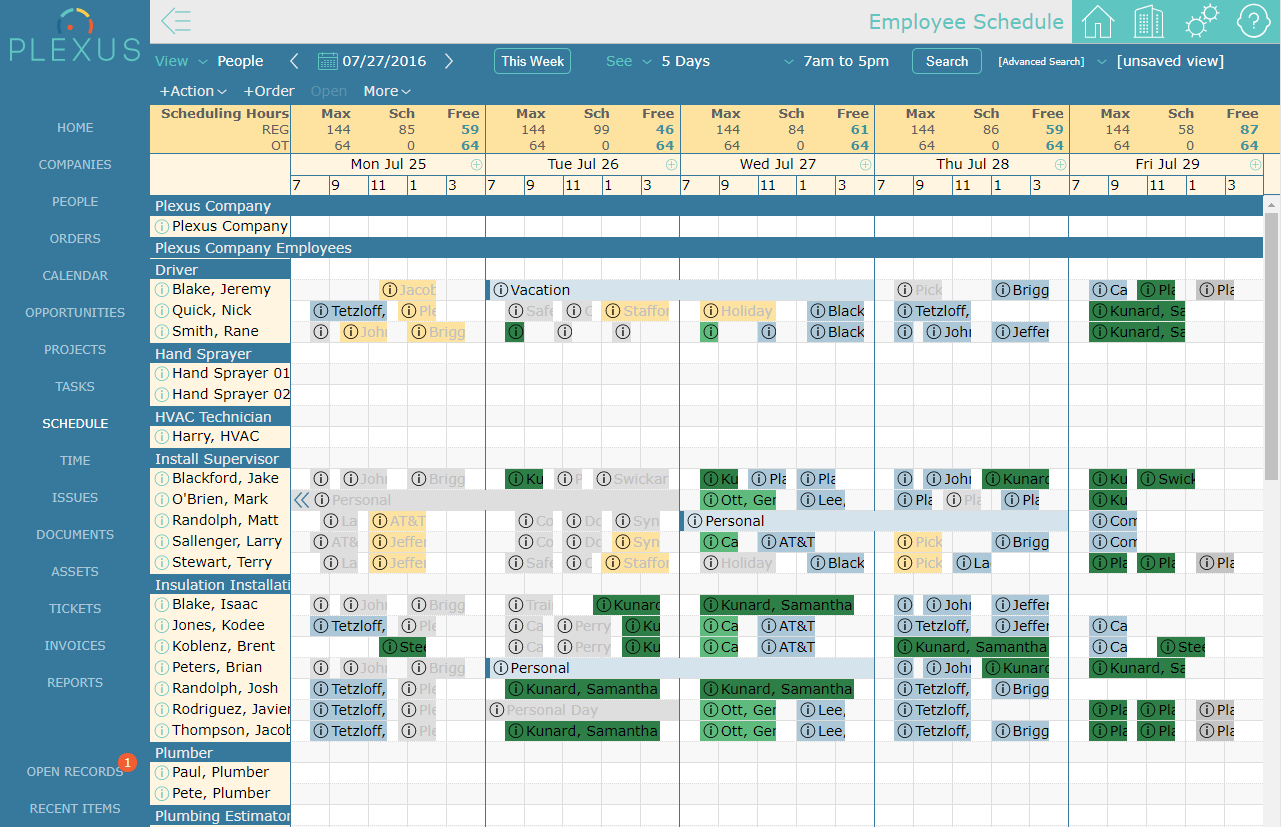
Scheduling makes your service company more effective because it ensures the best use of your most valued assets -- your employees. Plexus' Schedule module informs your team on the necessary manpower needed for each job, offers ease in assigning employees to jobs, alerts them automatically, and provides awareness of your team's capacity.
Scheduling empowers the scheduler to plan jobs based on each order's labor estimate, organized by labor type, to ensure the size of the crew and hours scheduled match the scope.
Skill-Based Employee Suggestions highlight employees for scheduling whose skills match the work requirements for specific tasks within a job.
The Capacity View provides a snapshot of available manpower amongst your crew and outsourced labor to assist the sales team and scheduler.
Soft Scheduling reserves employee hours, which updates total capacity, without the scheduler having to identify specific employees.
The Schedule Calendar enables schedulers from different departments to view the specific jobs and tasks to be scheduled.
Definable Schedule Statuses customize the scheduling workflow, illustrated with color-coded schedule blocks.
Block Out Time for Employees display when employees are unavailable.
Dispatching Emails and Text Messages to each individual automates communication of the next day's schedule as well as any last-minute schedule changes.
Customer Price Catalogs apply special pricing for selected customers automatically.
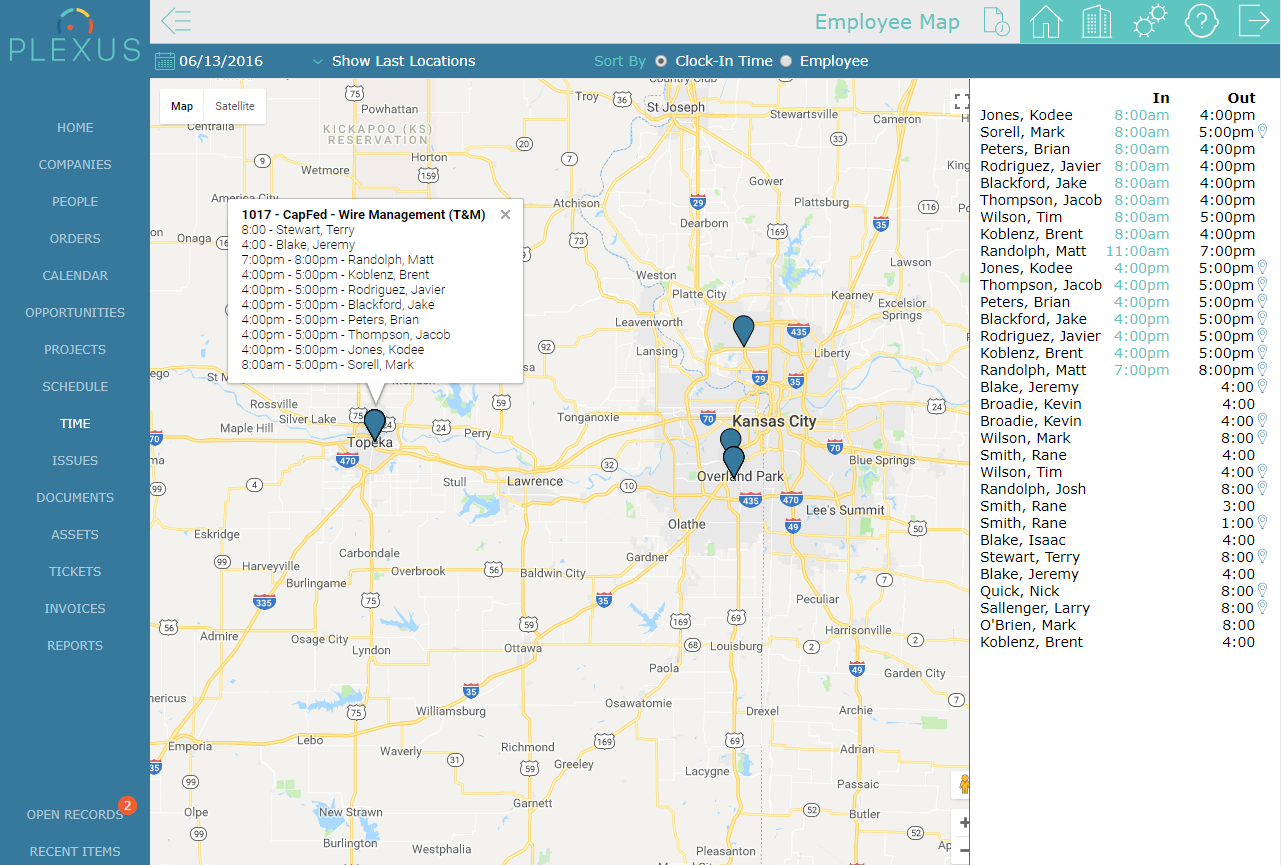
Time collection is a necessary but tedious task for service companies. Plexus' Time module collects the data for payroll, provides job costing information, and simplifies time tracking for employees who can clock-in from their mobile devices or computer. Streamlined time tracking ensures greater accuracy, and when coupled with Plexus' robust reporting system, you can make more informed business decisions.
Time Sheets replace paper time sheets, providing daily updates to each job as time is booked, and eliminating the need to rekey time data for payroll.
The Employee Time Summary Overview displays an employee's recorded time for specific time periods and provides historical documentation of billable and nonbillable time.
The Work Order Time Summary Overview provides an at-a-glance review of the order's labor costs and the times associated with all employees for each work order.
Bulk Employee Time Input shows all workers associated with a work order on a single screen, allowing supervisors to enter all employee time at once.
Time Rules allow you to define and enforce policies when overtime and double-time are granted to hourly employees.
Timesheet Approval enables supervisors to review employee time sheets before they're sent to payroll, and notifies the employee automatically of any discrepancies.
Job Costing for employees and third party labor is based on each worker's wages, providing managers with accurate job costing.
Job Costing for Prevailing Wages enables accurate job cost orders when employees work on jobs that require prevailing wage pay.
Mobile Device Time Entry collects time and GPS location data from field employees.
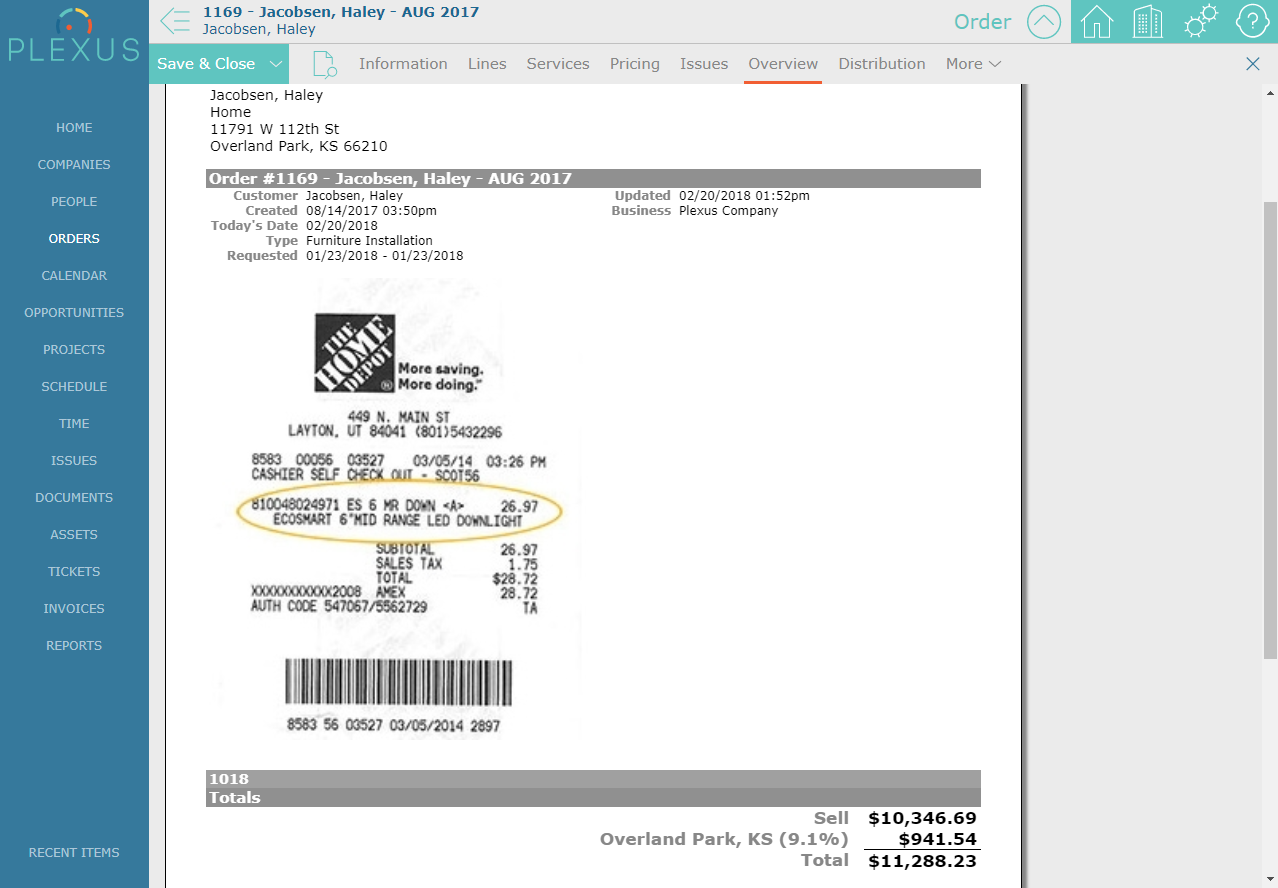
It can be difficult to keep track of the unforeseen expenses, such as an employee buying an extra part needed. Plexus' Expenses module helps you account for the small things that impact profit, and ensures you have the appropriate information to invoice a customer, reimburse an employee, and accurately job cost.
Expense Tracking organizes project and employee expenses based on the appropriate order to help with accurate reporting and job costing.
Mobile Expense Capture enables employees to take a picture of the receipt and assign it to the correct job using their mobile device.
Selling Expenses allows for the resale of expenses incurred as the job progresses. Expenses can be sold at a quoted amount up-front, or they can be sold as expenses accumulate, to facilitate time and material billing.
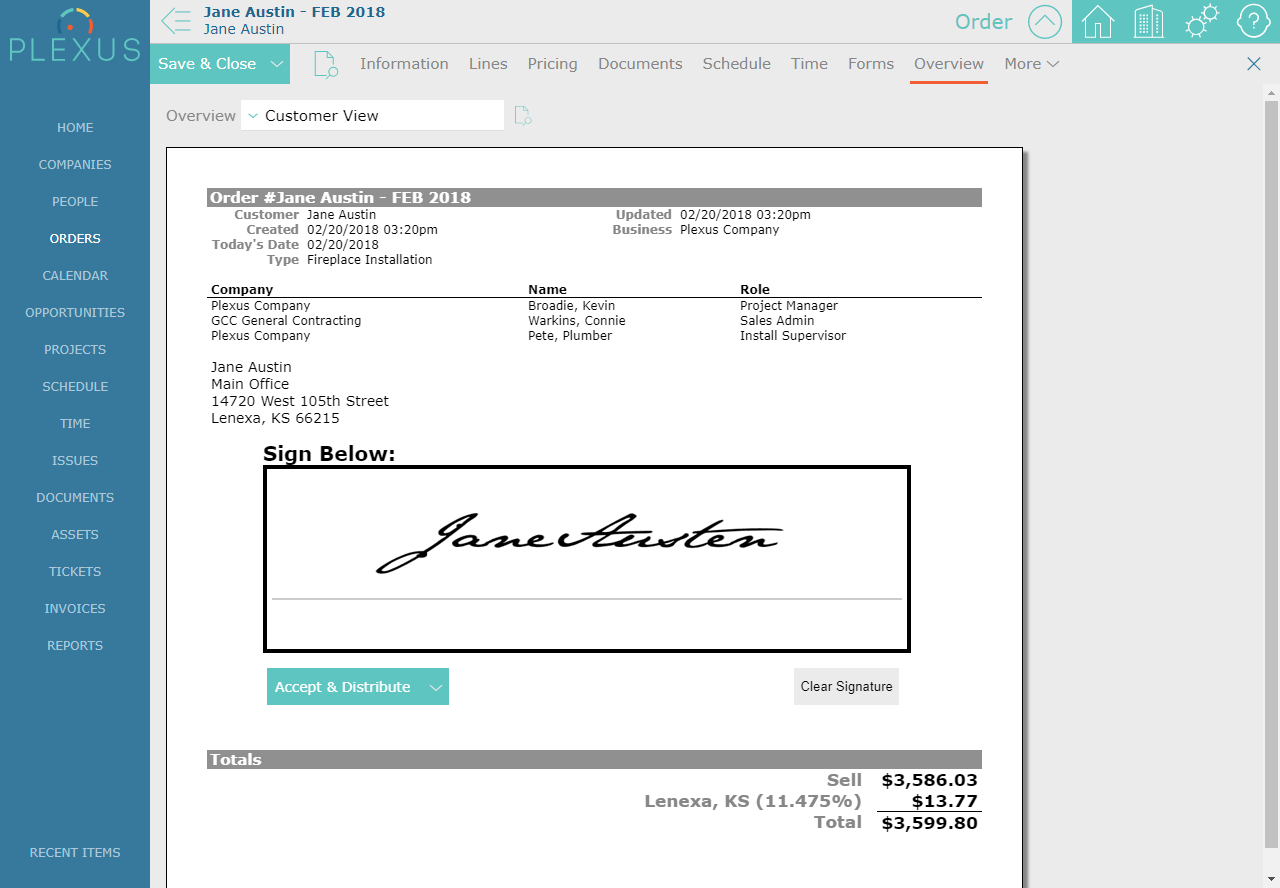
Ensuring your company gets paid accurately and on time is critical for the success of every service company, which is why invoicing is so central to business operations. Plexus' Invoices module allows you to invoice in a way that's best for your customers and your business. Whether it's batch invoice, partial invoice, or progressive invoice, the Invoices module allows you to tailor invoices to meet the business needs of your company and your customers.
Multiple Order Invoicing allows the batching of many orders into one invoice.
Partial Invoicing splits orders into multiple invoices.
Progress Invoicing facilitates scenarios like monthly billing based on hours work or percentage completed on larger orders.
Recurring Invoices facilitate repetitive billing based on customer contracts.
Mass Invoicing allows administrators to quickly invoice batches of orders either by one invoice per order, or one invoice per customer.
Invoice Percentages enables administrators to invoice a percent of the total.
Invoice Corrections correct invoices with manual adjustments to the quantity or dollar amount per line item.
Invoice Deletion removes invoices and returns all associated dollars to the invoiceable column, eliminating the need for journal entry reversals.
QuickBooks Online Integration automatically sends each invoice to ensure QuickBooks is always in sync.
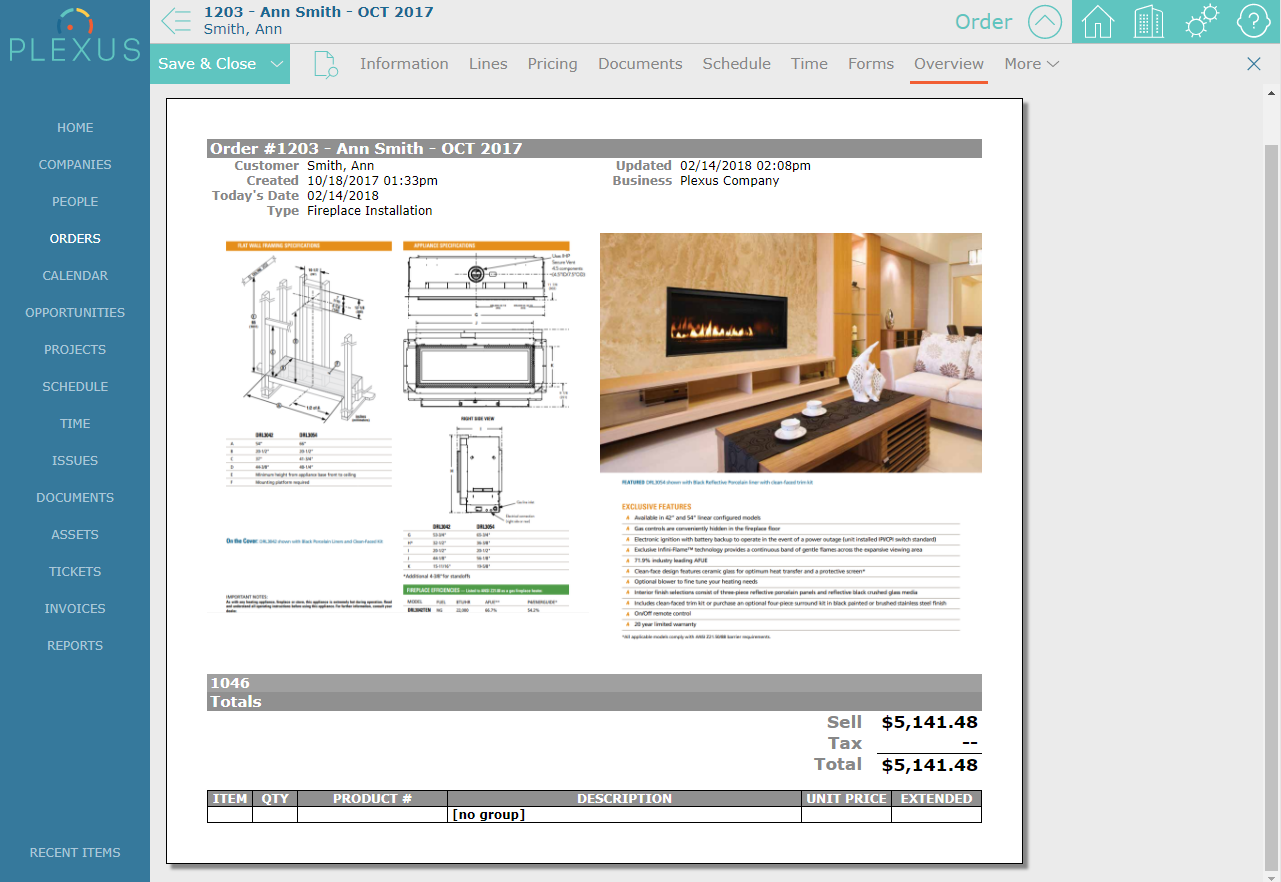
Not being able to find the right files can be time consuming and frustrating. Plexus' Documents module enables online storing and sharing of electronic documents tied to the correct project, order, task, issue, and company to keep all associated information organized and integrated. Also, with check-in / check-out functionality and historical tracking, Plexus provides version control and easy access to the most up-to-date documents.
Upload Multiple Documents at once without exiting Plexus or utilizing a separate file transfer protocol (FTP) application.
Check-In/Check-Out controls document access, ownership, and modification, as editing can be limited to one person at a time. Modifications are automatically tracked in revision history.
Flag Documents to ensure only the correct documents are disclosed to each party involved.
Emailed Overviews provide access to documents without requiring a login to Plexus.
Permissions manage specific view and edit access for documents and folders, which can be defined for specific people, companies, and security groups.
Document Association allows documents to be tied to projects, orders, invoices, and issues, and provides the latest revision to anyone with access.
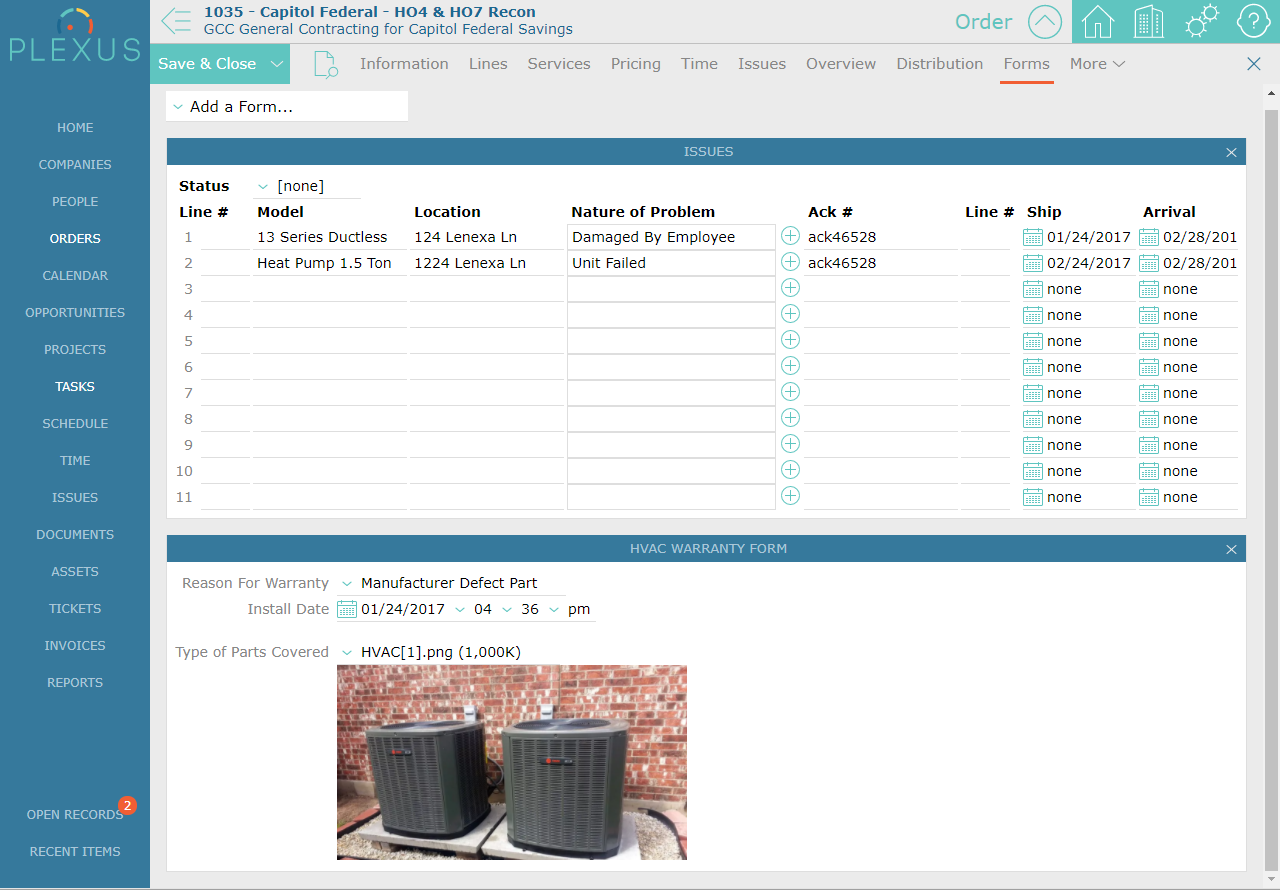
To maintain an efficient work flow and to keep your clients happy, it's crucial to ensure you acknowledge and resolve work related issues in a timely fashion. Plexus' Issues module records and tracks issues, and links them to orders and projects for accurate reporting and timely resolution. Quickly recognizing and solving issues makes your customer experience stand out from your competitors.
Daily Progress Reports record daily accomplishments into forms customized for each job type along with necessary documents and photos, which can be sent directly to the customer.
Issue Types define and track issues to keep them organized.
Customer, Site, and Employee Association sort and categorize issues, as well as display issue completion and perform queries for issue analysis and follow-up.
User Dashboards display issues that require follow-up to ensure important tasks and details don't fall through the cracks.
Order and Project Association associate issues with orders and projects for increased visibility and collaborative resolution.
Simple User Interfaces create and associate new issues in less than a minute.
Dynamic Checklists record and track sub-issues that contribute to resolving an issue.
Reporting displays outstanding issues organized by customer, order, project, and employee, providing easy access to the issues resolution team.
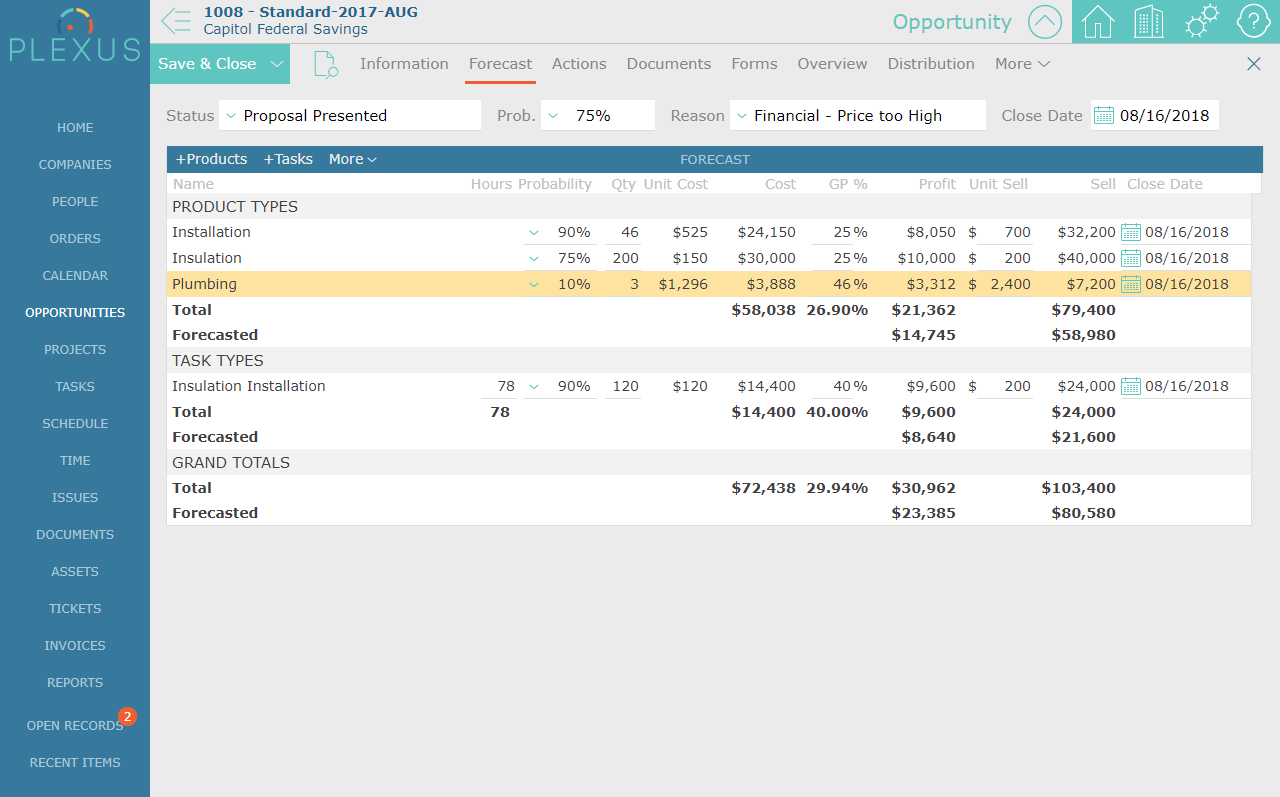
Capturing data throughout your entire sales process enables you to determine business profitability from various angles. Plexus' Opportunities module manages all sales data and forecasting to help management make informed decisions and plan for the future. Also, as the opportunity develops, Plexus eliminates data re-entry by allowing you to easily convert the opportunity into an order.
Manage Sales Leads by entering potential sales, notes, and contact information to keep track of multiple leads.
Forecasts are created at a high level to help determine the probability of closing the deal, which influences the forecasted value, providing management with an outlook on sales.
Actions maintain a historical log of activity for each specific opportunity.
Automated Schedule Distribution sends each salesperson their schedule in a daily email.
Lead-to-Prospect-to-Customer Conversion indicates which companies are maturing through your sales funnel.
Salespeople can be assigned to contacts individually or as part of a sales team pursuing a lead.
Reminders can be setup to trigger emails for following-up with prospects and opportunities.
Custom Forms capture information in a manner that's customized to your business requirements.
Sales Opportunity Participants track everyone involved in a sales opportunity including customer contacts, salespeople, and support staff.
Building Formal Proposals can be built from each opportunity. The formal proposal replaces the opportunity's forecast with the proposal's updated numbers.
Automatic Updates to the Opportunity's Status can be automatically triggered by the formal proposal as the order's status changes, linking the sales process to the overall business process.
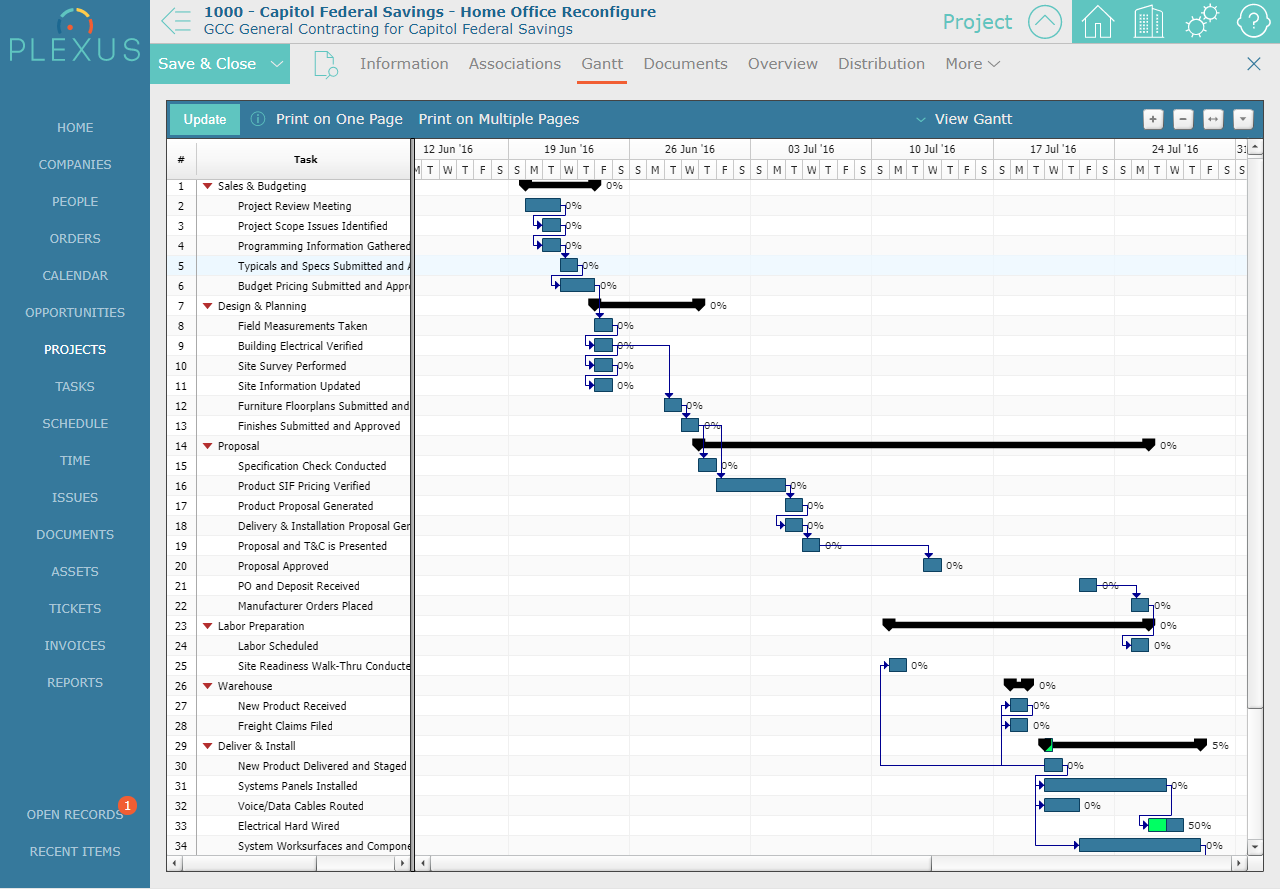
Managing large projects is complicated. The Projects module enables companies to pull together their multi-phase jobs with complex contingencies. The centralized location of all project-related information ensures easy team communication, and enables continual status and profitability monitoring.
Gantt Charts visually lay out task dependencies, organized by phases, to assist project managers in coordinating complex projects. The target dates automatically adjust as tasks are completed.
Task Date Constraints and Dependencies provide multiple ways to organize your project schedule, including defining the 'must start on' dates and forcing tasks to start before or after the ending of another task or phase.
Role Assignments assign users to specific project roles and include them automatically on project update notifications.
Task Warnings monitor the end dates of tasks and inform associated parties of potential delays, increasing awareness and proactivity.
Overseeing Multi-Location and Multi-Phase Orders is possible as projects pull in multiple multi-phase orders and place their tasks onto the Gantt Chart for long-range planning.
Document Associations link documents to specific projects for centralized access to files.
Customizable Forms can be created for each type of project.
Financial Overviews display sell and cost data, completion percentages, variance, and estimated, actual, and projected costs for each order associated with a project.
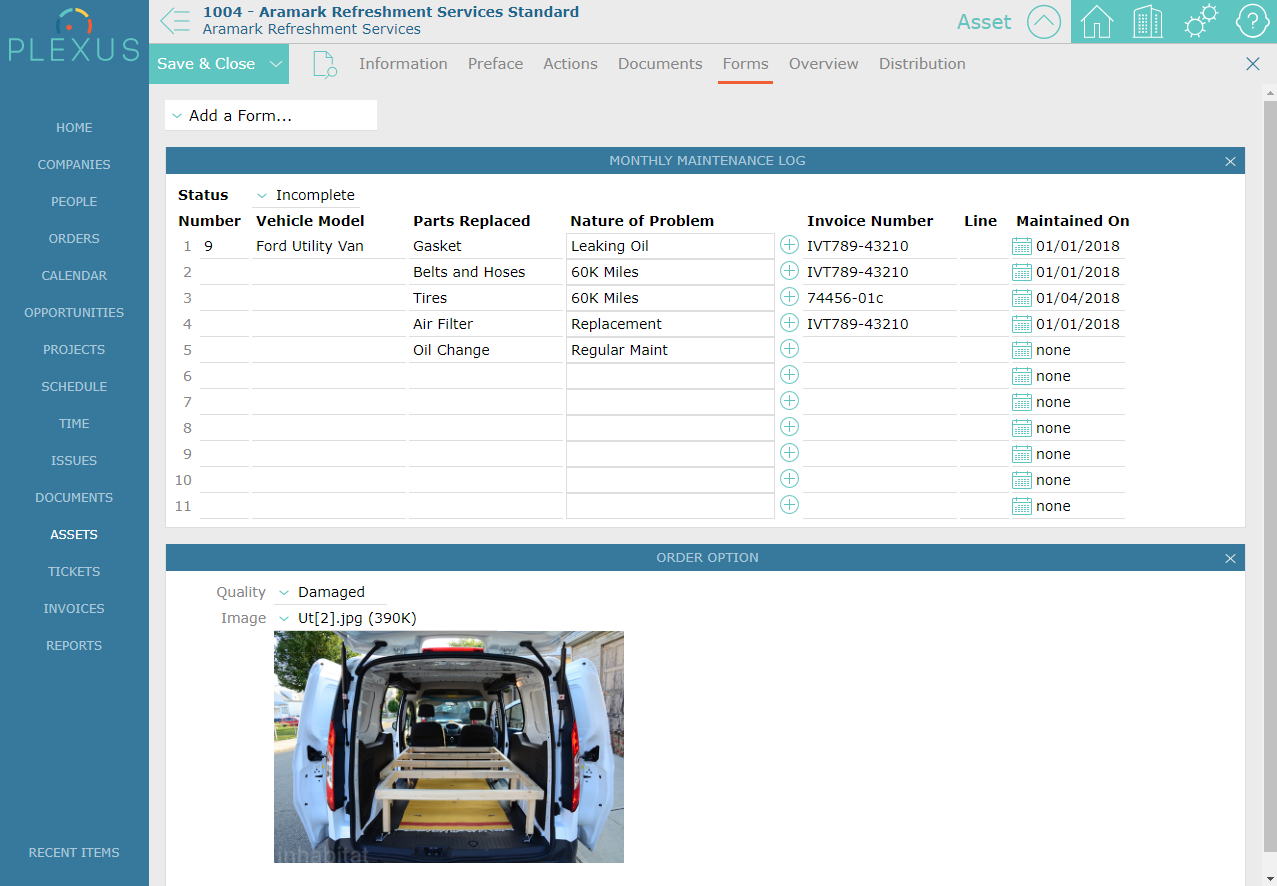
Service companies must constantly monitor equipment rentals, maintenance history, and requirements. When managing multiple assets, it's crucial to know specifically what maintenance is required and when it should be performed. Keep track of your assets by linking them to service orders, locations, and specific clients, and with Plexus' robust reporting, you can view service or rental history connected to each asset.
Asset Types enable different assets to have their own list of statuses to accurately define each asset's process, whether it's rental equipment, business-owned equipment, or customer-owned equipment.
Asset Forms capture all of the necessary asset related data.
Asset Associations link assets to physical locations, specific companies/customers, the customer's clients, subcontractors, documents, and orders for accurate asset reporting.
Recurring Orders support periodic billable asset related work, useful for both internal maintenance and maintenance contracts for your customers.
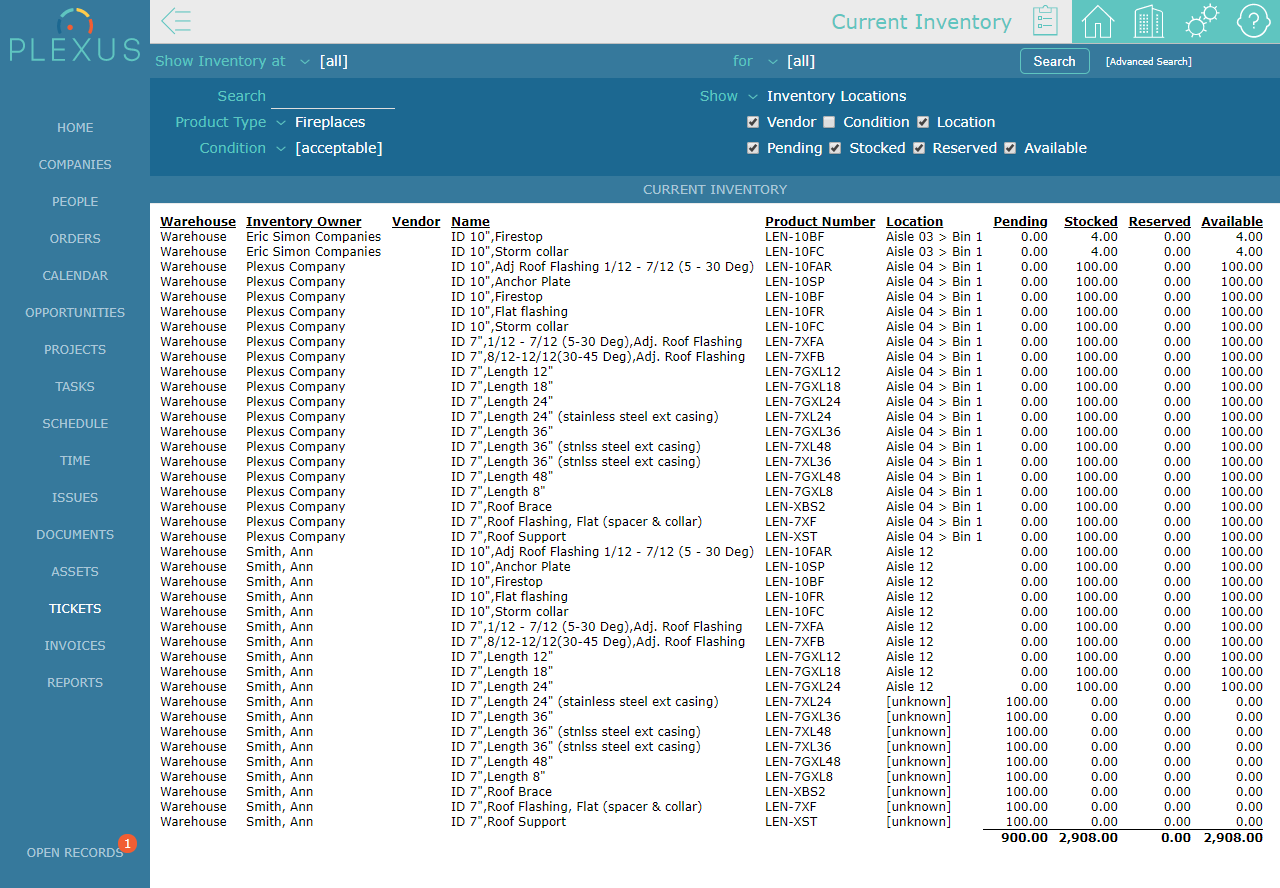
Managing inventory counts is a hassle, but it's important for delivering excellent service and reducing waste, both of which boost your bottom line. Plexus' Inventory module allows you to connect your order process to your warehouse through stock and pull tickets so that your entire process from sales to inventory to invoicing is all in one system.
Inventory Tickets track the stocking and pulling of inventory, and provide a formal record of items moved.
Current Inventory Reports display up-to-date quantities of each inventory item.
Ticket Types make distinctions between tickets by defining various ticket types and the workflow they need.
Inventory Movement displays the status of each inventory item including its condition and location, and whether it's available, pending, stocked, or reserved.
Conditions define whether items are acceptable, damaged, or unusable using customizable characteristics.
Multiple Warehouses support an unlimited number of places where inventory can be stored.
Locations define where items are stored using categories including warehouse, aisle, row, bay, and level.
Special Orders can be easily received into inventory and turned around for delivery and installation.
Backorder and Quantity Checking specify whether or not users can exceed the available quantity of an inventoried item.
Image Display allows users to upload item images for easy recognition and user reference.
Ticket Reporting tracks all associated notes, actions, documents, and form data for each ticket.
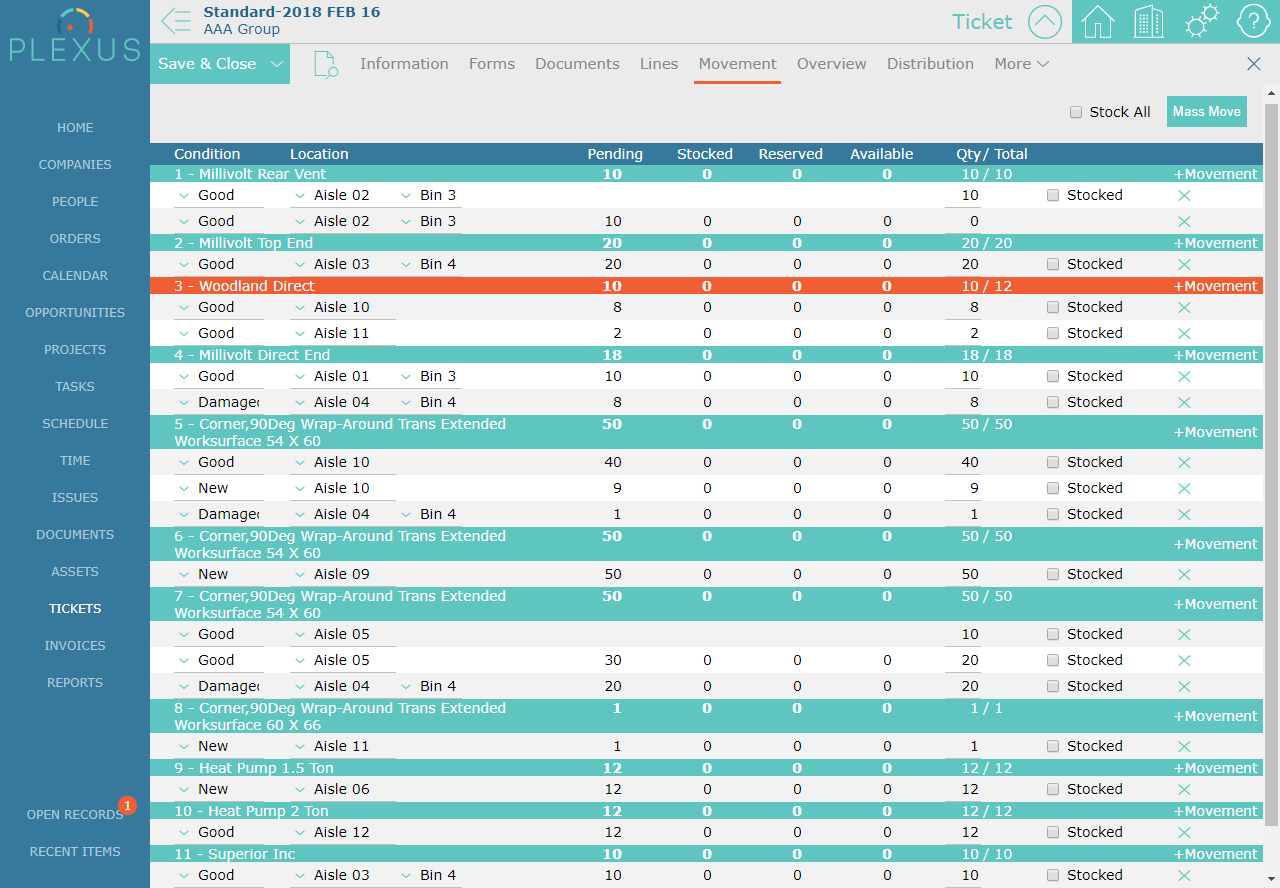
Tracking every item received in your warehouse is costly and time consuming; however, it's still essential to know when items are received in order to inform administrative staff for invoicing purposes. When detailed inventory counts are not necessary, the Tickets module tracks what comes into the warehouse at a high level, and reports which items are needed for upcoming projects.
Receiving using the Tickets module is ideal when managing 'just-in-time' or 'cross-dock' inventory to avoid cataloging items that will not remain in your warehouse for more than a few days.
Document Uploads enables maintaining and sharing documentation, such as the bill of lading, with the administrative staff.
Customizable Forms customize the collection and reporting of receiving tickets.
Print Labels create printable tags for easy identification of products associated with specific orders.
Product Pull Reports produce reports with location and tag information so the warehouse can easily pull items.
30-day+ (Extended) Storage Reports display the square footage totals for all customers with shipments stored over 30 days for invoicing purposes.
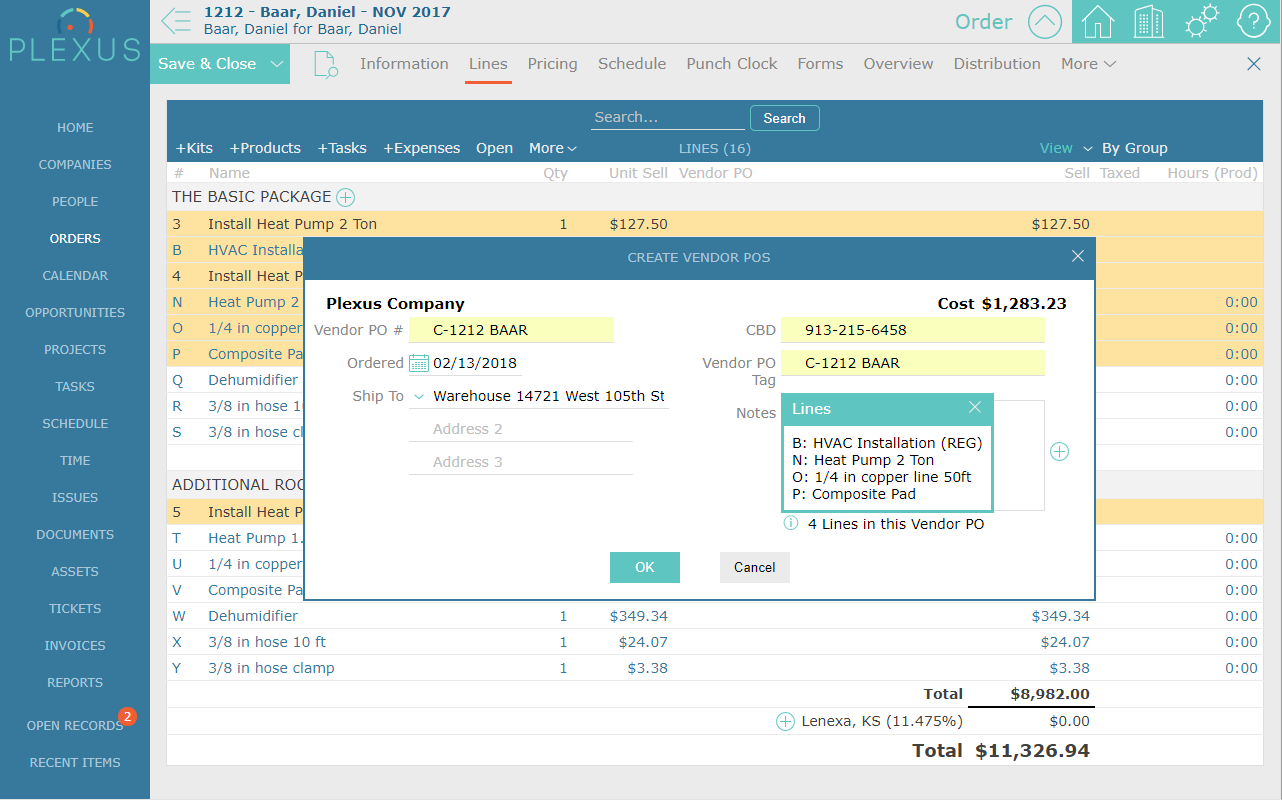
Ordering special products from the manufacturer or hiring third party labor is crucial to many businesses. Having vendor purchase orders (PO), acknowledgements, and vendor invoices built into your ordering process keeps everything connected to the sales order, ensuring that the vendor's costs are included in the overall job cost.
Vendor POs are created from within a sales order. Plexus identifies each vendor in the sales order and offers to create a Vendor PO for each.
Vendor PO Distributions can be emailed to vendors, automating the purchasing process.
Acknowledgements can be received from vendors with updated shipping dates, pricing, and other details.
Receiving shipments into your warehouse is made easy by selecting which Vendor PO is arriving on the truck. This helps manage sales orders with two or more vendors who arrive at different times.
Avoid rekeying information between systems with our QuickBooks-Plexus integration. Transfer relevant information from Plexus directly to QuickBooks without hassle or data entry errors.
